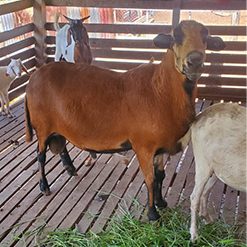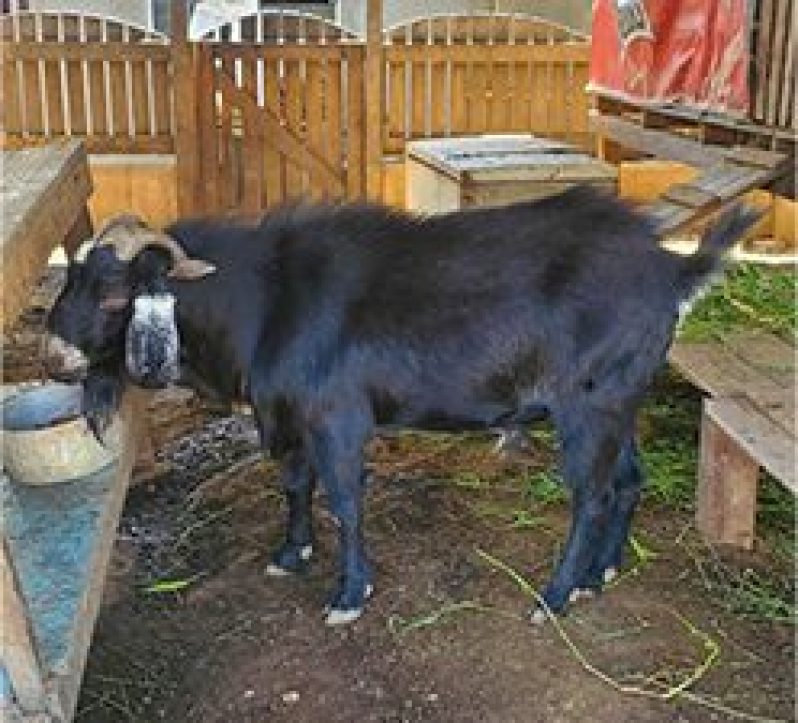Triple-time winner aims for ruminant trophy
AFTER serving in the Guyana Police Force (GPF) during one of the nation’s most turbulent periods, former police officer, Ramdath Baichoo, made a life-changing decision—one that would reconnect him with his heritage and sustain his family.
More than a decade ago, amid the challenges of the crime wave, Baichoo left the Force and turned full-time to small ruminant farming, a vocation that has since become both his livelihood and passion.
Today, the resident of Number 37 Village, West Coast Berbice, is a respected livestock farmer and Executive Member of the West Berbice Goat and Sheep Association, playing an active role in supporting fellow farmers and promoting improved animal husbandry across the region.
With over thirty years of experience, Baichoo currently manages a flock of thirty-eight Barbados Black Belly sheep and a herd of more than eighty Nubian goats, all of which are bred primarily for genetic improvement and sustainable production.
His entries for this year’s GLDA ruminant competition include his prized “stud” Barbados Black Belly ram and a Nubian billy goat—both animals that have secured him the top regional prize three times in past competitions.
Confident in his chances, Baichoo remarked that while winning is an honour, his true motivation lies in demonstrating what is achievable through dedication, proper nutrition, and excellent animal care. “It’s not just about the trophy,” he said. “It’s about showing what can be done when you truly invest in your animals.”

From law enforcement to livestock
Baichoo’s journey into farming was deeply rooted in his upbringing. Born into a family of farmers, he spent his childhood living with his grandparents, who reared animals long before he was born.
It was there, as a boy, that he learned the intricacies of caring for livestock.
“After school, I would help round up the animals, especially when they went into trenches or drains. I was always the one who had to go after them and lead them home after grazing in the open spaces in the backdam,” he recalled with a smile.
He vividly remembers the evenings spent wading through the thick green mass of the trenches, which often caused his skin to itch, prompting him to rush home for a much-needed bath and apply homemade coconut oil for relief.
As a child, Baichoo’s grandparents gifted him a single sheep—an act that would eventually define his future. From that one animal, his flock gradually multiplied over the years, shaping the path he would later follow as a professional livestock farmer.
Before becoming a full-time farmer, Baichoo briefly dabbled in the fishing industry. During his years as a police officer stationed at Cane Grove, East Coast Demerara, he met and married his wife, a local of that village.
Together, they later moved back to his home village of Number 37, West Coast Berbice, where he established his farm and began rearing goats and sheep as a full-time income earner.
Government support strengthening the industry
A significant turning point came two years ago when Baichoo received a Barbados Black Belly ram through the Government of Guyana’s Genetic Improvement Programme, spearheaded by the Guyana Livestock Development Authority (GLDA) under the Ministry of Agriculture.
The initiative aims to enhance the national small ruminant stock by distributing genetically superior breeding animals.
For Baichoo, this intervention transformed his operation. “Since the introduction of the Barbados Black Belly ram, my flock has become stronger, healthier, and more productive,” he explained. “The offspring have excellent qualities, and I’ve seen significant improvement in both size and resilience.”
He praised the government’s ongoing commitment to the livestock sector, noting that such programmes have created sustainable livelihoods for rural families like his. “Farming is more than just employment—it’s a way of life,” Baichoo said proudly.
Adopting climate-smart practices
Recognising the increasing impact of climate change on livestock production, Baichoo decided to implement an elevated pen system—a climate-smart initiative developed by the GLDA. The materials for the construction were donated, allowing Baichoo to build the structure efficiently.
He explained that before adopting the elevated system, he used a flat-floor pen, which often became waterlogged during the rainy season. “It was difficult to maintain a clean, dry, and comfortable space for my animals,” he said. “But with the new elevated pen, the difference is tremendous.”
The elevated design allows for better drainage, improved ventilation, and enhanced hygiene, ensuring the animals remain dry and healthy throughout the year. Waste matter falls through the slatted floor, making cleaning easier and minimising disease risks.
“Now I can rest peacefully at night knowing my animals are comfortable,” he added with satisfaction.
The adoption of this climate-resilient infrastructure underscores Baichoo’s commitment to sustainable livestock production and aligns with the national drive toward modern, adaptive farming systems.
A philosophy rooted in nutrition and genetics
Baichoo firmly believes that animal nutrition and genetics are the twin pillars of successful livestock production. “The quality of what we feed our animals and their genetic makeup determine their health and productivity,” he explained.
He allows his flock to graze near the mangrove forest by the seaside, where the naturally salty grass enhances weight gain and helps prevent internal parasites. “I believe one of the reasons my animals require little or no medication is because of the quality of grass and soil in my pasture,” he added.
His animals are primarily grass-fed, supplemented with locally purchased feed and vitamin mixes. This balanced approach yields strong, healthy animals that perform well in both breeding and meat production.
Commitment to quality breeding and farmer support
Baichoo takes great pride in being an excellent breeder and is dedicated to helping “one farmer at a time” improve their operations.
While breeding is his primary focus, he also sells a portion of his animals for meat, contributing to food security and the development of Guyana’s livestock industry.
He maintains detailed records of all births on his farm and registers each animal with GLDA to ensure proper traceability and data management—an essential practice for modern livestock farming.
His disciplined approach and openness to adopting new technologies have earned him the respect of fellow farmers and livestock officers alike.
Partnership with GLDA and family’s support
Baichoo is deeply grateful for the ongoing support provided by GLDA’s extension team, notably Ms Carmelita Fleming, Livestock Officer for the region, and Dr Dilchand, a GLDA veterinarian. “Ms Fleming has been instrumental in the development of my flock—she’s always just a call away,” he said. “The entire GLDA team’s commitment to farmers like me is something I truly value.”
He regularly participates in training and capacity-building sessions organised by GLDA to stay updated on new farming techniques, animal health management, and sustainable practices.
At home, farming is very much a family affair. His wife and two children are actively involved in daily farm activities, especially during lambing and kidding seasons. When new animals are born, his wife lovingly prepares nutritious porridge made from Quaker oats, cow’s milk, and local spices, which they feed to the newborns through baby bottles. “We treat them like part of the family,” he said warmly.
Sustaining livelihoods, building futures
Today, Ramdath Baichoo stands as a shining example of resilience, innovation, and dedication. His transition from law enforcement to livestock farming reflects not only personal reinvention but also the transformative potential of Guyana’s small ruminant industry.
Through government-led genetic improvement programmes, climate-smart innovations, and strong technical partnerships between farmers and the GLDA, the sector continues to strengthen rural livelihoods, ensure food security, and promote sustainable agricultural growth.
For Baichoo, every new birth in his flock represents more than just an addition to his herd—it is a symbol of renewal, endurance, and the bright future of Guyana’s livestock industry.




.jpg)










